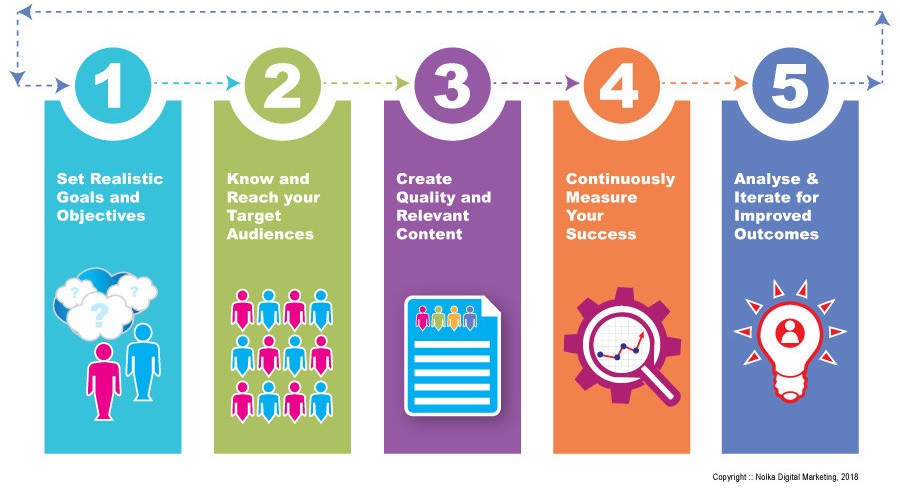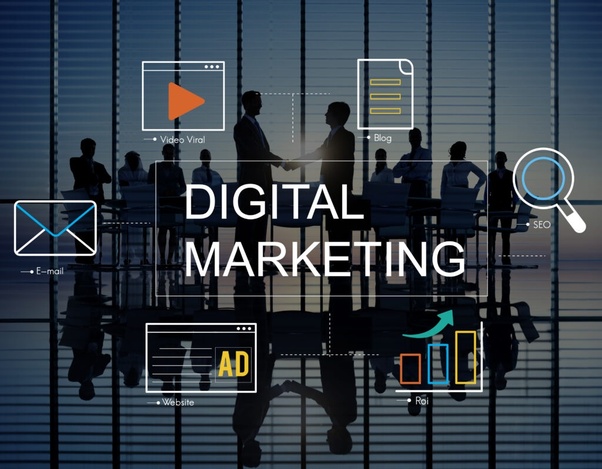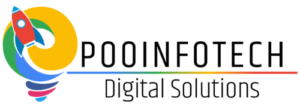Table of Contents
Introduction
Digital marketing refers to the use of digital channels, platforms, and technologies to promote and sell products or services to consumers and businesses. Unlike traditional marketing methods that rely on physical media such as newspapers, magazines, or direct mail, digital marketing leverages the power of the internet and electronic devices to reach and engage audiences in a more dynamic, interactive, and targeted manner.
Learn the fundamentals of digital marketing with Pooinfotech. Learn about digital marketing, how it works, and the advantages and disadvantages. Ideal for students and corporations.In today’s digital world, knowing digital marketing is critical for both organizations and people. So, what exactly is digital marketing? At Pooinfotech, we strive to demystify this important aspect of modern business.
What Is Digital marketing?
Defination
Digital marketing is a way to promote products or services using the internet and various digital tools. It involves activities like using social media platforms such as Facebook, Instagram, and Twitter to share content, run advertisements, and engage with followers.
Email marketing is another key aspect, where businesses send promotional emails to inform subscribers about new products, offers, or updates. Search Engine Optimization (SEO) plays a crucial role by improving a website’s content and structure to achieve higher rankings in search engine results, making it easier for potential customers to find the business online. Content marketing involves creating and sharing valuable content like blog posts, videos, and infographics to attract and engage an audience. Pay-Per-Click (PPC) advertising allows businesses to run ads on search engines or other websites and pay each time someone clicks on their ad.
Additionally, affiliate marketing involves partnering with other businesses or influencers who promote the products in exchange for a commission on the sales they generate. Digital marketing helps businesses reach a larger audience, track their efforts more easily, and adjust their strategies quickly based on data and feedback.

Key Components of Digital Marketing
- Search Engine Optimization (SEO)
- Content Marketing
- Social Media Marketing
- Pay-Per-Click (PPC) Advertising
- Email Marketing
- Affiliate Marketing
- Influencer Marketing
- Mobile Marketing
How Digital Marketing Works

Digital Marketing Funnel
Awareness: This is the top of the funnel, where potential customers first become aware of your brand or product. Marketing efforts at this stage focus on reaching a broad audience through channels like social media, SEO, content marketing, and paid advertisements to generate brand recognition and attract initial interest.
Interest: Once awareness is established, the goal is to spark interest in your product or service. This involves engaging content that provides more detailed information about what you offer, highlighting benefits and features. Tactics include email marketing, blog posts, and informative videos to keep the audience engaged and interested.
Consideration: At this stage, potential customers are evaluating your product or service more seriously. They compare options and consider how your offering meets their needs. Providing detailed product information, customer reviews, case studies, and comparison guides can help persuade them to consider your brand over competitors.
Intent: Here, prospects show signs of a strong interest in purchasing. They might add items to their cart, sign up for a demo, or download a trial. Marketing strategies at this stage should focus on nurturing leads through personalized content, targeted offers, and follow-up emails to encourage the decision to buy.
Evaluation: During the evaluation phase, potential customers are making their final decisions about whether to purchase. They look for reassurances, such as free trials, testimonials, and guarantees. Providing exceptional customer support and addressing any concerns directly can help move them towards a purchase.
Purchase: The final stage of the funnel is where the prospect completes the transaction and becomes a customer. Ensuring a smooth and seamless purchase process is critical. Post-purchase follow-ups, thank-you messages, and onboarding emails can help start the customer relationship on a positive note and encourage future loyalty.
Successful Strategies and Techniques

- SEO and Content Marketing: Search engine optimization, or SEO, is the process of making your website more visible on search engines like Google.It includes keyword analysis as well as off-page (backlinks) and on-page (meta tags, headers and content) optimization.By creating informative and relevant content that brings in and engages your target audience, content marketing enhances SEO. Common content mechanisms that can boost your SEO and position your company as an expert in your sector are blog posts, articles, videos, and infographics.
- Social media marketing: This is about using social media platforms like Facebook, Instagram, Twitter, and LinkedIn to promote your brand. You create and share posts, images, and videos to engage with your audience. You can also run ads on these platforms to reach more people. Responding to comments and messages quickly is important to keep your followers engaged.
- PPC Advertising: PPC stands for Pay-Per-Click. This means you pay a fee each time someone clicks on your ad. You can run PPC ads on Google and social media platforms. You bid on keywords related to your business, and your ads show up when people search for those terms. PPC can quickly drive traffic to your site and boost sales.
- Email Campaigns: Email marketing involves sending messages to people who have signed up for your email list. You can send them newsletters, promotional offers, or updates about your products. Personalized emails with the recipient’s name and tailored content can increase engagement. Automated emails can save time and ensure timely communication.
- Affiliate and Influencer Marketing: Affiliate marketing is when you partner with other people or companies who promote your products and earn a commission on sales. Influencer marketing involves working with popular social media personalities who share your products with their followers. Both strategies help you reach a larger audience and build trust through recommendations.
- Video Marketing: Video marketing uses videos to promote your brand. You can create tutorials, product demos, customer testimonials, or live streams. Videos are engaging and can be shared on platforms like YouTube, social media, and your website. They help explain complex ideas simply and keep viewers interested.
- Webinars and Live Streaming: Hosting webinars and live streams allows you to share your expertise and connect with your audience in real-time. Webinars are online presentations where you can teach or discuss topics related to your business. Live streaming on Facebook, Instagram, or YouTube lets you interact directly with viewers, answer their questions, and build a community.
- Mobile Marketing: Mobile marketing is about reaching your audience through their smartphones. This includes SMS marketing, mobile apps, and making sure your website works well on mobile devices. Since many people use their phones to browse the internet, mobile marketing ensures they can easily access and engage with your content.
Pros of Digital Marketing
Discover the benefits of digital marketing with Pooinfotech. Learn how digital marketing can be cost-effective, measurable, and globally impactful.

Digital marketing offers numerous advantages, including:
- Cost-Effective: Often more affordable than traditional marketing methods, online marketing offers a better return on investment (ROI).
- Measurable Results: Tools like Google Analytics allow businesses to track the performance of their campaigns in real-time.
- Targeted Audience Reach: Online marketing enables precise targeting based on demographics, interests, and behaviors.
- Increased Engagement: Social media and interactive content can enhance customer engagement and brand loyalty.
- Global Reach: The internet provides access to a global audience, expanding market potential.
Cons of Digital Marketing
Understand the challenges of digital marketing with Pooinfotech. Explore the high competition, evolving trends, and technical issues faced.

While online marketing has many benefits, it also comes with some challenges.
- High Competition: The digital space is crowded, making it difficult to stand out.
- Constantly Evolving: Digital marketing trends and algorithms change frequently, requiring continuous learning and adaptation.
- Time-consuming: Developing and maintaining effective online marketing campaigns can be time-intensive.
- Technical Issues: Websites can face technical issues that hinder marketing efforts and user experience.
Conclusion
Conclude your journey into Online marketing with Pooinfotech. Learn how mastering Online marketing can drive business success.
Online marketing is a dynamic and powerful tool that can drive business success when implemented correctly. Whether you are a business owner or a student looking to understand the field, grasping the fundamentals of online marketing is essential in today’s digital age. At Pooinfotech, we offer comprehensive online marketing classes that cover everything from SEO to social media marketing, ensuring you have the skills to succeed.
FAQs
Get answers to common questions about online marketing with Pooinfotech. Learn about goals, benefits for small businesses, and expected results.
What is the main goal of online marketing?
The main goal is to connect with consumers online, where they spend much of their time, to promote products or services and drive conversions.
Can small businesses benefit from online marketing?
Absolutely! Online marketing is highly scalable and can be customized to fit the budget and goals of small businesses.
How long does it take to see results from online marketing?
The timeline can vary depending on the strategy. SEO, for instance, can take several months, while PPC campaigns can generate traffic almost immediately.
Join Pooinfotech’s digital marketing classes today!
Ready to master the art of digital marketing? Enroll in our comprehensive digital marketing classes and start driving success for your business or career.
